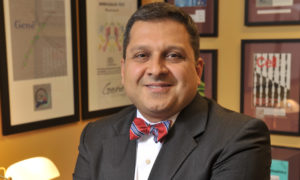
Northwestern Medicine scientists have identified compounds that could slow cancer growth by interrupting a gene transcription process, according to a study published in Cell.
Targeting cancer cells with small chains of peptides — known as KL-1 and KL-2 — delayed tumor progression in mouse models by disrupting the super elongation complex (SEC), according to Ali Shilatifard, PhD, the Robert Francis Furchgott Professor, chair of Biochemistry and Molecular Genetics and senior author of the study.
“We demonstrated over 20 years ago that the transcription elongation rate is central for cancer cells to grow, but nobody had been able to control it,” said Shilatifard, also director of the Simpson Querrey Center for Epigenetics and a professor of Pediatrics. “Now we have developed at Northwestern University for the first time chemical tool compounds that can.”
The SEC regulates transcriptional elongation, a key step in gene transcription. Previous studies demonstrated that malfunctions in SEC contribute to a variety of diseases, including many cancers, but targeting cells with a defective complex has proved difficult thus far.
In the current study, Shilatifard collaborated with Gary Schiltz, PhD, research professor of Pharmacology, deputy director of the Center for Molecular Innovation and Drug Discovery (CMIDD) and co-author of the study, to find a molecule that can disrupt the SEC in cancer cells, thereby slowing cancer cell proliferation.
The investigators examined SEC’s crystal structure, pinpointing a weak spot where a large number of proteins interacted with each other. By developing chemical tool compounds that block this interaction, they could disrupt the protein activity and stability of SEC. According to Kaiwei Liang, PhD, postdoctoral research fellow in the Shilatifard laboratory and the lead author of the study, this approach was preferable to other, more global inhibitory strategies.
“We disrupted the protein-protein interaction within SEC instead of inhibiting the pan-kinase activity of CDK9, which exists in other complexes — pan-CDK9 inhibitors result in more side effects,” Liang said.
The scientists then used a large-scale molecular assay, simulating the use of over ten million compounds, before synthesizing the 160 most promising for real-world experimentation. Out of these 160 compounds, two compounds they named KL-1 and KL-2 were found to most effectively inhibit SEC function in both laboratory tests and live mouse models with cancer, who survived significantly longer when treated with the compounds.
“KL-1 and KL-2 are the first class of SEC inhibitors and have been shown to inhibit SEC in multiple biological models,” Liang said. “These SEC inhibitors could be very promising for the treatment of these diseases.”
In addition, cancers caused in part by common mutations in the MYC gene were also sensitive to the inhibitors, suggesting involvement of transcription elongation in MYC-related cancers, according to the study. Further investigation could shed light on both viable therapies and the process of transcription elongation in general.
“This provides us with a platform to regulate the rate of transcription and elongation for the first time in vivo,” Shilatifard said.
Other Northwestern co-authors include Edwin Smith, PhD, research professor of Biochemistry and Molecular Genetics; Rama Mishra, PhD, research assistant professor of Pharmacology and senior cheminformatics specialist at ChemCore; Rintaro Hashizume, MD, PhD, assistant professor of Neurological Surgery and of Biochemistry and Molecular Genetics; Kristen Stoltz, PhD, medicinal chemist at the CMIDD, and Shilatifard laboratory members Ashley Woodfin, bioinformatician; Emily Rendleman, research technician; Stacy Marshall, lab manager; David Murray, research technician; Lu Wang, PhD, postdoctoral research fellow and Patrick Ozark, bioinformatician.
Shilatifard, Schiltz, Smith and Hashizume are members of the Robert H. Lurie Comprehensive Cancer Center of Northwestern University.






